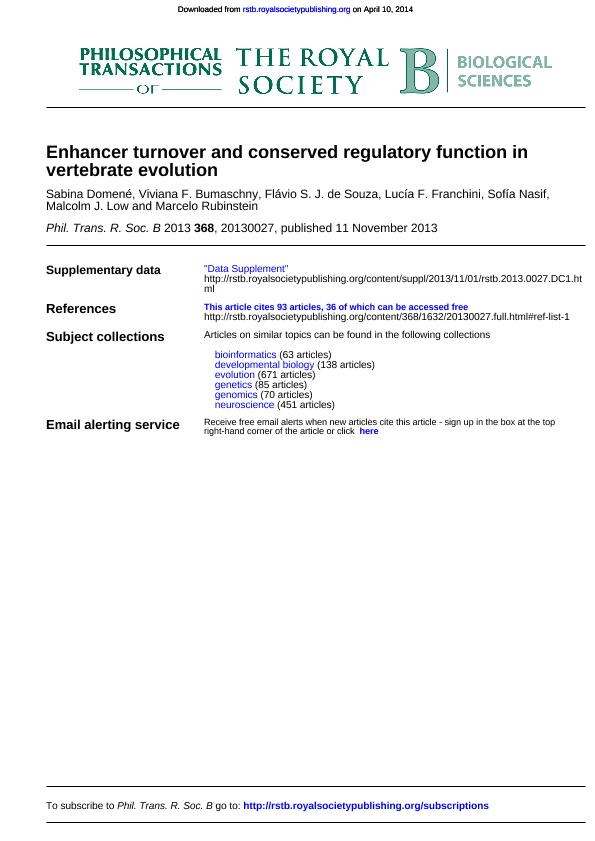Mostrar el registro sencillo del ítem
dc.contributor.author
Domene, Sabina

dc.contributor.author
Bumaschny, Viviana Florencia

dc.contributor.author
Silva Junqueira de Souza, Flavio
dc.contributor.author
Franchini, Lucia Florencia

dc.contributor.author
Nasif, Sofia

dc.contributor.author
Low, Malcolm J.
dc.contributor.author
Rubinstein, Marcelo

dc.date.available
2016-02-03T20:29:40Z
dc.date.issued
2013-12
dc.identifier.citation
Domene, Sabina; Bumaschny, Viviana Florencia; Silva Junqueira de Souza, Flavio; Franchini, Lucia Florencia; Nasif, Sofia; et al.; Enhancer turnover and conserved regulatory function in vertebrate evolution; The Royal Society; Philosophical Transactions of the Royal Society B: Biological Sciences; 368; 1632; 12-2013; 1-15
dc.identifier.issn
0962-8436
dc.identifier.uri
http://hdl.handle.net/11336/4015
dc.description.abstract
Mutations in regulatory regions including enhancers are an important source of variation and innovation during evolution. Enhancers can evolve by changes in the sequence, arrangement and repertoire of transcription factor binding sites, but whole enhancers can also be lost or gained in certain lineages in a process of turnover. The proopiomelanocortin gene (Pomc), which encodes a prohormone, is expressed in the pituitary and hypothalamus of all jawed vertebrates. We have previously described that hypothalamic Pomc expression in mammals is controlled by two enhancers?nPE1 and nPE2?that are derived from transposable elements and that presumably replaced the ancestral neuronal Pomc regulatory regions. Here, we show that nPE1 and nPE2, even though they are mammalian novelties with no homologous counterpart in other vertebrates, nevertheless can drive gene expression specifically to POMC neurons in the hypothalamus of larval and adult transgenic zebrafish. This indicates that when neuronal Pomc enhancers originated de novo during early mammalian evolution, the newly created cis- and trans-codes were similar to the ancestral ones. We also identify the neuronal regulatory region of zebrafish pomca and confirm that it is not homologous to the mammalian enhancers. Our work sheds light on the process of gene regulatory evolution by showing how a locus can undergo enhancer turnover and nevertheless maintain the ancestral transcriptional output.
dc.format
application/pdf
dc.language.iso
eng
dc.publisher
The Royal Society

dc.rights
info:eu-repo/semantics/openAccess
dc.rights.uri
https://creativecommons.org/licenses/by-nc-sa/2.5/ar/
dc.subject
Transgenic Zebrafish
dc.subject
Proopiomelanocortin
dc.subject
Hypothalamus
dc.subject
Enhancers
dc.subject
Transgenic Zebrafish
dc.subject
Mammals
dc.subject
Teleosts
dc.subject
Comparative Genomics
dc.subject.classification
Genética y Herencia

dc.subject.classification
Ciencias Biológicas

dc.subject.classification
CIENCIAS NATURALES Y EXACTAS

dc.subject.classification
Biología del Desarrollo

dc.subject.classification
Ciencias Biológicas

dc.subject.classification
CIENCIAS NATURALES Y EXACTAS

dc.title
Enhancer turnover and conserved regulatory function in vertebrate evolution
dc.type
info:eu-repo/semantics/article
dc.type
info:ar-repo/semantics/artículo
dc.type
info:eu-repo/semantics/publishedVersion
dc.date.updated
2016-03-30 10:35:44.97925-03
dc.journal.volume
368
dc.journal.number
1632
dc.journal.pagination
1-15
dc.journal.pais
Reino Unido

dc.journal.ciudad
Londres
dc.description.fil
Fil: Domene, Sabina. Consejo Nacional de Investigaciones Científicas y Técnicas. Instituto de Investigaciones en Ingeniería Genética y Biología Molecular; Argentina
dc.description.fil
Fil: Bumaschny, Viviana Florencia. Consejo Nacional de Investigaciones Científicas y Técnicas. Instituto de Investigaciones en Ingeniería Genética y Biología Molecular; Argentina. Universidad de Buenos Aires. Facultad de Medicina; Argentina
dc.description.fil
Fil: Silva Junqueira de Souza, Flavio. Consejo Nacional de Investigaciones Científicas y Técnicas. Instituto de Investigaciones en Ingeniería Genética y Biología Molecular; Argentina. Universidad de Buenos Aires. Facultad de Ciencias Exactas y Naturales; Argentina
dc.description.fil
Fil: Franchini, Lucia Florencia. Consejo Nacional de Investigaciones Científicas y Técnicas. Instituto de Investigaciones en Ingeniería Genética y Biología Molecular; Argentina
dc.description.fil
Fil: Nasif, Sofia. Consejo Nacional de Investigaciones Científicas y Técnicas. Instituto de Investigaciones en Ingeniería Genética y Biología Molecular; Argentina
dc.description.fil
Fil: Low, Malcolm J.. University of Michigan. Medical School. Department of Molecular and Integrative Physiology; Estados Unidos
dc.description.fil
Fil: Rubinstein, Marcelo. Consejo Nacional de Investigaciones Científicas y Técnicas. Instituto de Investigaciones en Ingeniería Genética y Biología Molecular; Argentina. Universidad de Buenos Aires. Facultad de Ciencias Exactas y Naturales; Argentina
dc.journal.title
Philosophical Transactions of the Royal Society B: Biological Sciences

dc.relation.alternativeid
info:eu-repo/semantics/altIdentifier/url/http://rstb.royalsocietypublishing.org/content/368/1632/20130027.long
dc.relation.alternativeid
info:eu-repo/semantics/altIdentifier/issn/0962-8436
dc.relation.alternativeid
info:eu-repo/semantics/altIdentifier/url/http://www.ncbi.nlm.nih.gov/pmc/articles/PMC3826500/
dc.relation.alternativeid
info:eu-repo/semantics/altIdentifier/doi/http://dx.doi.org/10.1098%2Frstb.2013.0027
Archivos asociados
